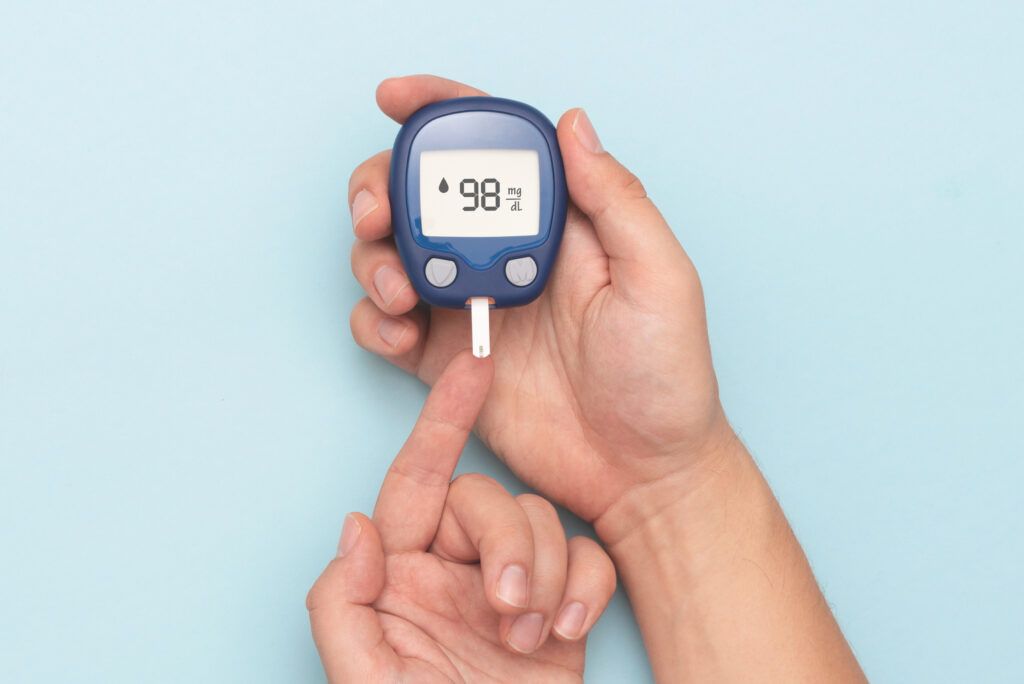One of the complications of diabetes that affects the eyes is diabetic retinopathy. If you are living with diabetes, being informed about diabetic retinopathy and its most common symptoms is the best way to protect your vision.
Keep reading to learn more about diabetic retinopathy, including the most common symptoms!
What is Diabetic Retinopathy?
Diabetic retinopathy generally develops in two stages. The early stage is non-proliferative diabetic retinopathy or NPDR, and the later stage is proliferative diabetic retinopathy, or PDR.

Non-Proliferative Diabetic Retinopathy (NPDR)
In the NPDR stage, the tiny blood vessels in the eye begin to weaken. Sometimes, they leak, causing swelling in the retina, which is the light-sensitive layer at the back of the eye.
In some cases, the macula, which is the part of the eye that processes central vision, will swell, a condition called macular edema. NDPR can also cause a condition called macular ischemia.
This condition occurs when blood vessels in the retina are closed off, preventing blood from reaching the macula. Also in the NDPR stage, exudates can form in the retina.
Exudates are tiny particles made of cells, proteins, and solid materials. They are caused by leaking blood vessels.
Proliferative Diabetic Retinopathy (PDR)
In the PDR stage, the retina begins to grow new blood vessels, a process known as neovascularization. These new blood vessels are often abnormally thin and can easily bleed into the vitreous, which is the clear, gel-like substance that fills up the eye between the lens and the retina.
These new blood vessels can form scar tissue, causing issues with the macula or leading to a detached retina. If diabetic retinopathy has progressed to the PDR stage, an individual’s central and peripheral vision can be severely impaired and eventually lead to permanent vision loss.
What are the Common Symptoms of Diabetic Retinopathy?
The most common symptoms of diabetic retinopathy can depend on how far the condition has progressed. Because diabetic retinopathy is usually painless as it develops, it is important for individuals who are high risk for this disease to be aware of and watch out for any symptoms.

At the NDPR stage, the most common symptoms are:
- Mild to moderate blurred or distorted vision
- The sudden appearance of floaters in the central field of vision
- Difficulty seeing well at night or in low light
- Changes in color perception or seeing colors as faded or washed out
- Difficulty reading or doing close-up tasks
In the PDR stage, NDRP symptoms can be more noticeable, and new, more serious symptoms can develop, including:
- Tunnel vision
- Increasingly severe vision loss
- Sudden serious vision problems, such as seeing a “curtain” or “veil” coming across your field of vision
- A marked increase in the number of floaters appearing in the central field of vision
- Sudden and significant decrease in vision (often due to blood leaking into the vitreous)
- Complete loss of central vision
At the first sign of any of these symptoms, a person should seek medical care with an experienced and knowledgeable eye care provider. Catching diabetic retinopathy in the NDPR stage can prevent potential vision loss in the PDR stage.
What Causes Diabetic Retinopathy?
Not all people with diabetes develop diabetic retinopathy. Individuals with diabetes are more likely to develop the condition if their blood sugar levels are not well controlled, if they have high blood pressure, or if they have high cholesterol.
When a person is first diagnosed with diabetes can also be a factor. The longer a person has diabetes, the more likely it is that they will develop diabetic retinopathy at some point in their lifetime.
How is Diabetic Retinopathy Treated?
Because the damage done by diabetic retinopathy cannot be reversed, the goal of treatment is usually preventing further damage to the eye and stopping future vision loss or impairment. Recommended treatment often depends on what stage the disease has reached.
If diabetic retinopathy is discovered in its earliest stages, a person may be advised to strictly control their blood sugar and blood pressure through diet and medication. Maintaining a healthy blood pressure helps to keep the blood vessels in the eye healthy, while good blood sugar control may even restore compromised vision.
More advanced cases may call for the use of treatments that use special drugs to reduce swelling of the macula or prevent the growth of new blood vessels in the eye. Both of these treatments aim to improve impaired vision and prevent further vision loss.
Other treatments for advanced diabetic retinopathy include laser surgery and a procedure called a vitrectomy. Laser surgery can be used to shrink or seal off leaking blood vessels as well as reduce swelling in the retina.
Can Diabetic Retinopathy be Prevented?

Being proactive about managing diabetes is the best way to prevent diabetic retinopathy or slow its progression. People with diabetes should be vigilant about properly monitoring and controlling their blood sugar levels, follow recommended dietary guidelines, exercise regularly, maintain a healthy weight, and schedule regular eye exams.
Individuals with diabetes are more likely to develop other serious eye conditions, including macular degeneration, glaucoma, and early-onset cataracts. Because of this increased risk, it is recommended that a person who has diabetes have their eyes examined at least once a year.
If you have diabetes, developing diabetic retinopathy may seem inevitable, but there are effective ways to protect your clear eyesight. Knowing how the disease develops, familiarizing yourself with the most common symptoms, and having your eyes checked annually can prevent diabetes and diabetic retinopathy from threatening your vision.
Are you experiencing changes in vision? Schedule an appointment at Nevada Eye Physicians in Carson City, NV, today!



